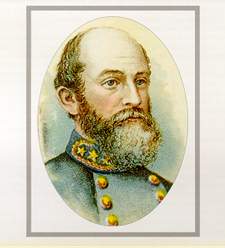| Richard Stodderd Ewell |
| BACK |
 |
February 8, 1817 - January 25, 1872
During the winter of 1861 - 1862, Lizinka Campbell Brown, one of the richest women in America, went to visit her son in the Confederate army in northern Virginia. He was the chief aide to Gen. Richard S. Ewell, a lisping, pop-eyed, beaked-nosed, baldheaded man who also happened to be Lizinka's cousin and love interest. Ewell courted and proposed to Lizinka during her stay, but she coyly refused to commit herself. Spring found Ewell and his division participating in Gen. Stonewall Jackson's victorious campaign over the Union forces in the Shenandoah Valley, and then they served in the Seven Days' campaign. Ewell earned a reputation as an aggressive fighter and a leader who saw to the welfare of his men, an attribute that won him their love and devotion. In the August 28, 1862 Battle of Groveton, Ewell received a wound that necessitated the amputation of his right leg. He was nursed by Lizinka during his long recovery, and on May 24, 1863, the couple married. Ewell was promoted to lieutenant general and given charge of the corps Jackson had commanded before receiving his mortal wound at Chancellorsville. Ewell's corps led the army into Pennsylvania and performed superbly at the 2d Battle of Winchester, Va., on June 14, capturing more than 4,000 Yankees, 23 cannon, and 300 full supply wagons -- a victory that caused some initially to call Ewell the "New Jackson." However, Ewell was by then a less aggressive fighter, caused possibly by the softening influence of his new bride or the trauma of losing a leg. On the first day of the Battle of Gettysburg, Pa., his reputation became tarnished because he did not try to snatch the high ground below the town from the defeated and demoralized Yankees who were busy entrenching there, as many thought Jackson would have. The Rebel's attempts over the next two days to capture that gound resulted in defeat and retreat to Virginia. Fascinating Fact: Ewell was known for his odd sense of humor. He was worried that he might be killed in Pennsylvania, specifically at Cashtown, where he thought the great battle would be fought. "It isn't that I mind getting killed," he said. "It's the idea that my name will go down in history as being killed at a place called Cashtown." |
